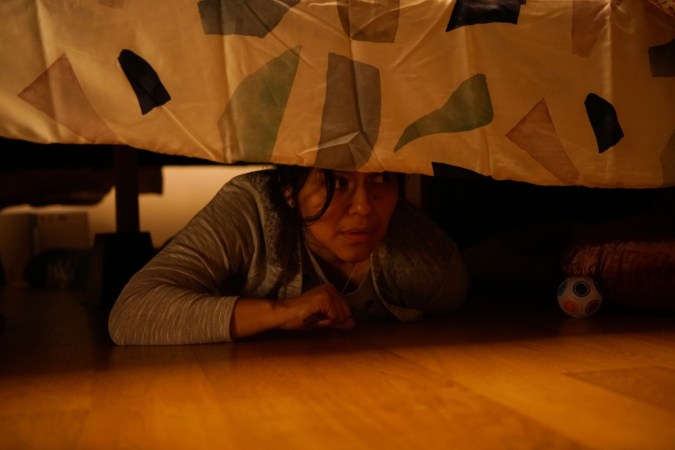The concept of the “two-sentence horror story” has been around for a few years. In 2013, a Reddit thread went viral when a user asked, “What is the best horror story you can come up with in two sentences?” It prompted thousands of responses. Since then, two-sentence horror stories have inspired storytellers worldwide to tap into their own anxieties and write thought-provoking, albeit abbreviated, spine-tinglers that yield sleepless nights for many readers.
For example: “There’s nothing like the laughter of a baby. Unless it’s 1 a.m. and you’re home alone” or “I’ve decided to kill off a few characters in the book I’m writing. It would definitely spice up my autobiography a little.”
Now, The CW has adapted the idea for the screen with the aptly named horror anthology series Two Sentence Horror Stories, which debuted on the network early last month. In the show’s fourth episode, “Hide,” which is currently available for viewing on The CW website and on The CW app, directors Rania Attieh and Daniel Garcia (Recommended by Enrique) challenge the perception of fear and the meaning of horror with a fairly conventional tale of a home invasion that ends with a heavy dose of unsettling reality.
The two sentences “Hide”finds its inspiration from are, “Knock, knock, I heard. But the monsters had already found their way inside.”

In “Hide,” actress Greta Quispe (After the Wedding) stars as Araceli Gomez, a mother of two, who is called at the last minute to work an evening shift as a nanny for the affluent Smythe family. Before she leaves for the gig, Araceli reminds her kids, Mateo (Dean Scott Vasquez) and Luisa (Rachel Salvatierra), that they are not to open the door to anyone, including the police.
“And what if things go bad?” Araceli asks her children before leaving them in the hands of their Tía Lety (Teresa Yenque).
“Call the numbers,” Luisa replies. Her answer, of course, implies that some of, if not all, the members of the family is undocumented and that “the numbers” will put them in touch with immigration legal services.
Once at the Smythe’s house (and after getting a suspicious look from a neighbor while waiting at the front door), Araceli tends to the family’s autistic 11-year-old daughter, Gracie (Zaria Degenhardt, and their bedridden grandfather sleeping upstairs. The 26-minute episode quickly takes a page from the playbook of generic home invasion thrillers like The Strangers or When a Stranger Calls. Two female intruders — each wearing a colorful hoodie and a plastic mask — step into the house with an assortment of sharp tools of torture and the paper fortuneteller that so many of us played with in middle school.
Episode writers Leon Hendrix III, Sehaj Sethi and Stephanie Adams-Santos don’t seem very interested in delivering anything but the basics in the subgenre. If audiences are looking for some sort of unique twist to occur between the masked aggressors and their potential victims, they shouldn’t hold their breaths. Composer Morgan Kibby does a fine job keeping the tension as high as possible with creepy piano beats and dissonant strings. Attieh and Garcia make an effective choice by using long camera shots to display the vastness of the home and the many hiding spots Gracie can choose from. Still, the clichés overshadow the episode — from disturbing baby monitor sounds to the fact that no one picks up a phone or breaks a window to call for help.
In the lead role, Quispe is memorable as a Latina mother who would do anything to protect her children — or any child for that matter. Her natural intuition and vigilant spirit prevail even when the script wallows in unoriginality. Despite the episode’s problems, however, the success of “Hide” is going to come down to its final landing and how predictable viewers deem it to be. For those who don’t expect it, “Hide”will hit hard in the pit of your stomach. Any horror project that can do that — without the proverbial monster lurking under the bed — is doing something right.
“Hide” is available to stream on The CW’s website and app.




